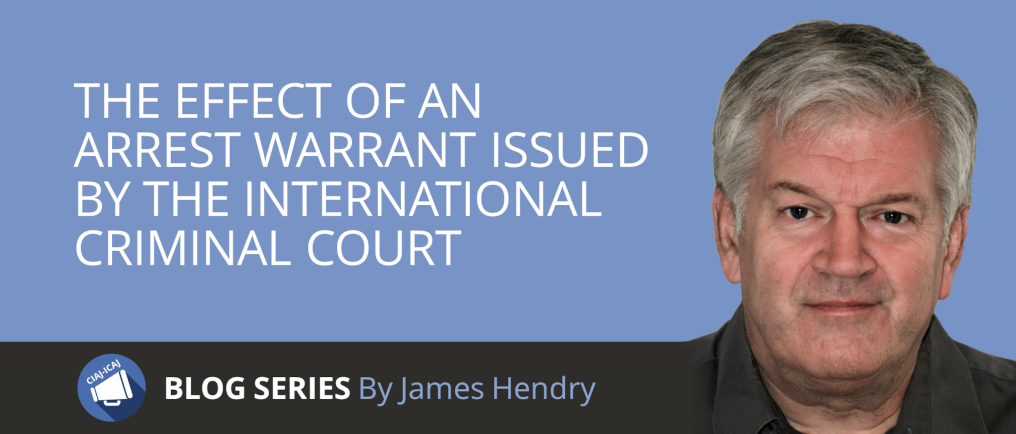The Effect of an Arrest Warrant Issued by the International Criminal Court

This blog post is part of a series on “SCC Decisions and more” written by CIAJ’s collaborator James Hendry. Read all his posts here.
In this piece, I consider the effect of the arrest warrants issued last March by the ICC for Vladimir Putin and his Commissioner for Children’s Rights, Maria Lvova-Belova. The warrants alleged the two were responsible for the war crime of unlawfully deporting children from Ukraine to Russia (contrary to articles 8(2)(a)(vii) and 8(2)(b)(viii) of the Rome Statute, the treaty creating the ICC with 123 State Parties). I’ll focus on Putin.
Since the Nuremberg and Tokyo trials, international criminal tribunals have applied a growing web of international criminal law including war crimes and crimes against humanity to persons accused of the most serious crimes of international concern. For example, last December, the convictions of the last surviving leaders of the Khmer Rouge regime, in which millions were killed or mistreated, were upheld on appeal at a special Cambodian criminal tribunal (here).
International Criminal Law
We have all heard of potential war crimes in the Ukraine conflict. However, in the international criminal justice sphere, the police do not answer 911; the procedural safeguards of many world legal systems are built into the Rome Statute itself; and the alleged crimes often involve thousands if not millions of victims and perpetrators. Investigations take a long time, with much judicial oversight even before a trial. The process depends on the cooperation of the States Party.
The ICC and Ukraine
The ICC Prosecutor announced on February 28, 2022, that he was going to open an investigation of crimes within the ICC’s jurisdiction in Ukraine commencing with events in 2014 (here). He called on States Party to exercise their right to refer the situation to the ICC and was answered within days by 41 of them with their referrals, including Canada’s (art. 14).
ICC jurisdiction is an important issue. For example, the ICC has jurisdiction over crimes committed on the territory of States Party. But Ukraine is not a State Party: it signed in 2000 but did not ratify. But recently, it declared acceptance of the ICC jurisdiction over crimes committed on its territory (art. 12). Russia is not a State Party.
A Pre-Trial Chamber of the ICC issued the warrant. This shows that the Prosecutor has evidence sufficient to demonstrate to the ICC that there are reasonable grounds to believe that Putin committed the crimes and that either it was necessary to bring him to trial, to prevent him from obstructing the investigation or to stop the crime (art. 58).
Executing the Warrant
Obviously, the actual execution of the arrest warrant will be a problem. Russia will not cooperate in executing the warrant on request by the ICC.
The Pre-Trial Chamber has the authority to request a State Party to arrest him (arts. 58-9). Only States Party are bound by a request to arrest; other states may volunteer (arts. 86–90).
Heads of State may be found liable for their crimes by the ICC. Recently, the Appeals Chamber of the ICC held Jordan breached the Rome Statute by failing to arrest President Al-Bashir of Sudan, who was subject to two ICC arrest warrants. It held the Rome Statute and customary international law (which binds all states), (a) excludes Head of State immunity from substantive adjudications of guilt before the ICC (art.27) (b) excludes procedural immunity for Heads of State from arrest by a State Party because that would interfere with adjudication and, (c) because Sudan was not a State Party, the UN Security Council resolution ordering Sudan to “cooperate fully” required it to act as though it was one (art. 98, here, paras. 119,122,132,143-5. The ruling is controversial (see here, here, and here).
Ukraine could try to arrest Putin voluntarily when he visits to view the progress of the conflict (here, and here). By declaring acceptance of the ICC’s jurisdiction, Ukraine bound itself to cooperate with the ICC (art.12(3)). But the Head of State immunity issue will arise again because Ukraine is not a State Party (arts. 87(5),98).
However, Putin may visit outside Russia, such as the South African BRICs summit in August 2023 (here, and here). South Africa is a State Party and has already been scolded for breaching its obligations to arrest Al-Bashir as he bounced around meeting Heads of State (here). The South African Supreme Court of Appeals reiterated this obligation as a matter of domestic law (here).
Al Bashir was not arrested until he had been toppled from power after a coup (here). Similarly, there have been rumours about high-level concerns about Putin’s handling of the Ukraine conflict (here). A coup might repeat Al-Bashir’s fate.
The arrest warrant against Putin for international crimes should affect his decisions about the conduct of the war. They have created nervousness among his colleagues and people and require his reconsidering future travel to States Parties (here). It signals a movement against impunity for international crimes (here).

